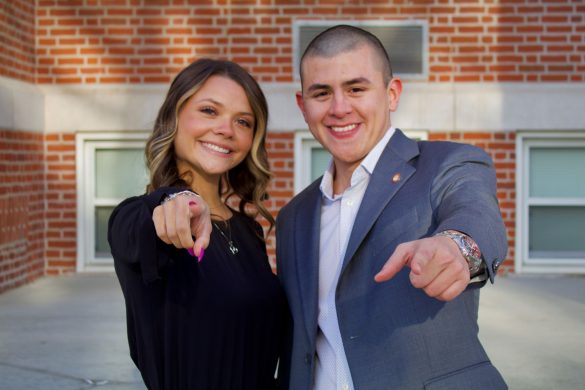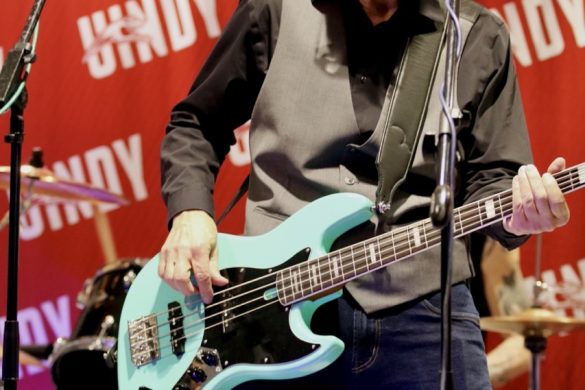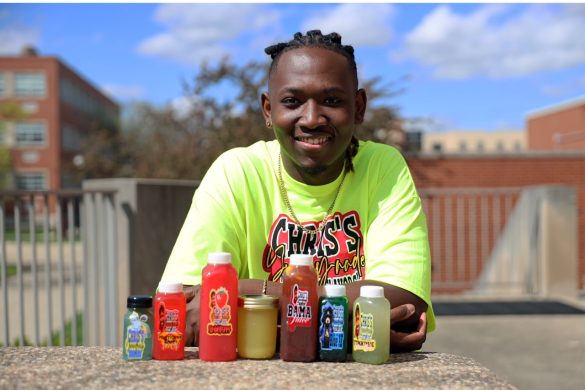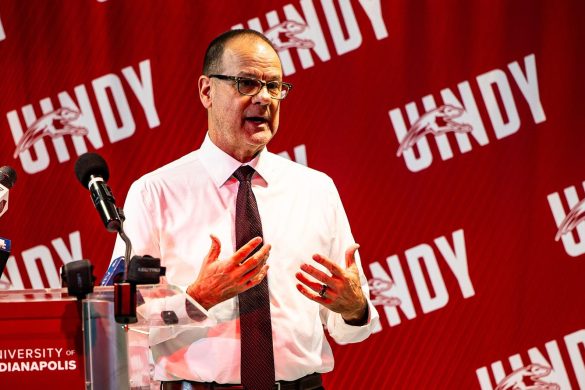The University of Indianapolis Athletics Department hosted U.S. gold medal swimmer Anthony Ervin on March 24 at 9 p.m. in the Schwitzer Student Center’s UIndy Hall. The event was open to UIndy student-athletes and the general student population.
Ervin was invited to campus to share his story about how he overcame adversity while managing to break world records at a young age. Ervin claimed gold and silver medals at the age of 19 in the 2000 Olympic Games in Sydney, Australia, plus two gold medals in the 2001 World Aquatics Championships in Fukuoka, Japan. He is a Division I National Collegiate Athletic Association seven-time champion, 27-time All-American as well as an eight-time record breaker.
Ervin said that he has had the privilege of being a successful swimmer, but that the decisions he was making in his life were not in line with the type of athlete he eventually wanted to become.
“Just recently, I was reading some Plato, the philosopher, and he was like, you know, sometimes people feel compelled to go out to do some community services. And I know that is something that is big here,” Ervin said during his presentation. “But I’m somewhat caught up in a bind because I was reading Plato, and it says before you go out there and try to be help in society, you have to learn how to care for yourself. ”
The event began with an introduction of Ervin by senior communication major Hayley Good, who is partly responsible for Ervin’s appearance.

Olympic swimmer Anthony Ervin talks with students after his speech. Ervin spoke at the University of Indianapolis on Tuesday, March 24 at 9 p.m. in UIndy Hall. Photo by Ainger Alexander
Ervin was honest with the audience as he shared the struggles he faced as a student-athlete and how some of his life decisions drastically impacted his life. He also said that he has terrible stage fright and almost had to cancel the event because of it.
“I was stunned that you guys don’t know me at all and have invited me to speak here,” Ervin said. “Truth be told, all I can really talk about is my life. I can try to give you guys ‘six steps to success,’ but the hard part is actually doing them. … So I am going to talk to you about my life. And the irony here is that because someone is a good athlete, or a great athlete, or the best athlete that does not make them the best person, or a great person, or even necessarily a good person.”
Ervin began his presentation by talking about his college experience, and how he failed at being a student-athlete. He said that he grew up with a father that was an alcoholic and a strict mother who did not allow him to do much while he was growing up. He said that because he was so sheltered growing up, when he got to college he was out of control.
“I didn’t get a lot of information from my dad, which is something that I really struggled with growing up,” Ervin said. “My mother was an orphan in New York City, so she went through some serious stuff that she won’t even talk about anymore, or really ever. Needless to say, it was bad enough that she became the most controlling, overprotective mother ever. I never got to do anything. So when I went away for college I just went completely crazy.”
Ervin’s wit and honesty throughout his presentation had a lasting impact on student-athlete and junior environmental sustainability major Jordan Loyd.
“I thought he was as real as it gets,” Loyd said. “He spoke freely and uncensored about his life, which made his stories easy to follow. I could tell that he was very talented, to make the Olympics without trying, and very fortunate to still have his own life.”
Ervin said that he was not a typical athlete. His goal was to do anything he could to get kicked off the team. He also talked about his first Olympic experience and how he was kicked out of the Olympic village and forced to watch the closing ceremony on a television.
The biggest realization Ervin came after he stopped swimming.
“I had become so alienated from who I thought I was supposed to be and who others thought I was, the life I was supposed to be living and the life I had gotten myself into, and I just couldn’t do it,” Ervin said. “I started over, and I was like, ‘You know what? I am going to quit swimming. I’m going to start doing that thing that I stopped doing: music.’ It’s funny, [but] once I stopped swimming, once that competitor’s mind-set was let go, a lot of my unhealthy habits really scaled back. I wasn’t abusing the drugs, the alcohol and the women. I started living a healthier lifestyle, and I needed that.”
After Ervin finished sharing his story, the floor was opened for questions and comments for students. Sophomore sports management major Chelsea Yeadon was really moved by Ervin’s life story and felt very motivated by his presentation.
“Listening to him speak was a bit of a riot,” Yeadon said. “I love how honest he was. It was great to see that someone who was really lost got to find their way and improve their life and actually admit to the mistakes that they have made and own up to them. He was very inspiring and definitely wasn’t what I was expecting him to be. I definitely wish him luck in his preparations for the next Olympics.”








